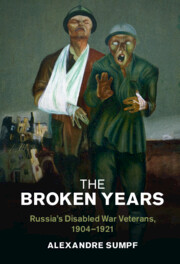Book contents
- The Broken Years
- Studies in the Social and Cultural History of Modern Warfare
- The Broken Years
- Copyright page
- Contents
- Figures
- Tables
- Acknowledgements
- Note on Usage
- Introduction
- 1 An Overwhelming Loss
- 2 The Right to Health
- 3 A Social Status Renegotiated by the War
- 4 Discriminatory Social Welfare
- 5 An Ephemeral Political Spring
- 6 The Devaluation of the War Experience
- Conclusion
- Bibliography
- Index
1 - An Overwhelming Loss
Published online by Cambridge University Press: 10 February 2022
- The Broken Years
- Studies in the Social and Cultural History of Modern Warfare
- The Broken Years
- Copyright page
- Contents
- Figures
- Tables
- Acknowledgements
- Note on Usage
- Introduction
- 1 An Overwhelming Loss
- 2 The Right to Health
- 3 A Social Status Renegotiated by the War
- 4 Discriminatory Social Welfare
- 5 An Ephemeral Political Spring
- 6 The Devaluation of the War Experience
- Conclusion
- Bibliography
- Index
Summary
The study begins with the formation mechanisms of a social group that were created almost ex nihilo by the war. Men became disabled by suffering an irremediable loss over the course of three conflicts of varying intensity between 1904 and 1921. We must first assess the scope of the loss, which is difficult to do, for in Russia, and then in the USSR, the tallies always provided approximate totals that were never definitive. This incredibly massive number was in fact a compilation of individual cases. In order to adopt the best way of approaching this experience, we have to detail the physical and moral ordeals that the soldiers endured from the time they were wounded until they ended up as disabled veterans: this process of transition weighed heavily on their ability to cope successfully. The army lost fighting forces, the men lost a part of themselves along with certain physical or mental capacities, and society lost its future workforce. The rhetoric of defeat, decline, and deficit heavily influenced the conception of the strikingly sudden, widespread phenomenon that exposed the moral fragility of the Russian nation. During the war, attitudes toward repairing bodies were polarised, torn between moralising suspicion (of self-inflicted wounds or simulation) and scientific uncertainties, military verifications and independent assessments of experts.
- Type
- Chapter
- Information
- The Broken YearsRussia's Disabled War Veterans, 1904–1921, pp. 17 - 54Publisher: Cambridge University PressPrint publication year: 2022

